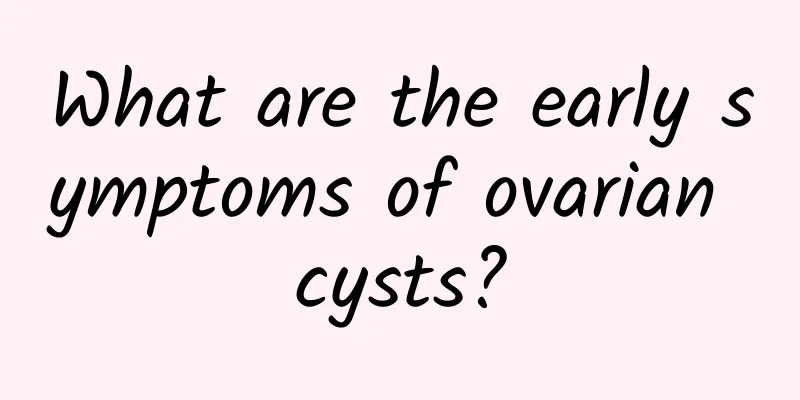What are the symptoms of functional uterine bleeding in female patients over 47 years old?

|
DUB is common in women over 47 years old, and is mainly manifested by irregular menstrual cycles, abnormal increase or decrease in menstrual flow, and may be accompanied by symptoms such as anemia and fatigue. Treatment should be based on the cause, including medication, surgery or lifestyle adjustments. 1. Symptoms of functional uterine bleeding Women over 47 are in perimenopause, their ovarian function gradually declines, and their hormone levels fluctuate greatly, which can easily lead to functional uterine bleeding. Common symptoms include: Menstrual cycle disorders: menstruation is early or late, the cycle is shortened or prolonged. Abnormal menstrual flow: Menstrual flow increases or decreases significantly, or even heavy bleeding or spotting occurs. Symptoms of anemia: Long-term bleeding may lead to anemia, which manifests as dizziness, fatigue, pale complexion, etc. Other discomforts: Some women may experience symptoms such as lower abdominal pain and back pain. 2. Causes of functional uterine bleeding The causes of functional uterine bleeding are complex and may be related to the following factors: Fluctuating hormone levels: The levels of estrogen and progesterone in perimenopausal women are unbalanced, leading to abnormal proliferation or shedding of the endometrium. Ovarian dysfunction: Decreased ovarian function and irregular ovulation affect the normal growth and shedding of the endometrium. Pathological factors: diseases such as endometrial polyps and uterine fibroids may aggravate bleeding symptoms. External factors: mental stress, overwork, irregular diet, etc. may also induce functional uterine bleeding. 3. Treatment of functional uterine bleeding For dysfunctional uterine bleeding, treatment options depend on the cause and severity of symptoms: Drug treatment: 1. Hormone therapy: such as oral contraceptives, progestins, etc., to regulate hormone levels and control bleeding. 2 Hemostatic drugs: such as tranexamic acid, to reduce the amount of bleeding. 3. Iron supplementation: used to improve anemia symptoms. Surgical treatment: 1. Endometrial resection: Suitable for patients who are ineffective with drug treatment. 2. Uterine artery embolization: used to control acute massive bleeding. 3. Hysterectomy: Suitable for severe cases or combined with other uterine diseases. Lifestyle Adjustments: 1. Dietary adjustment: Eat more foods rich in iron and protein, such as lean meat, spinach, red dates, etc. 2 Moderate exercise: such as yoga and walking, helps relieve stress and improve endocrine function. 3. Maintain a regular schedule: avoid staying up late and keep a good mood. Dysfunctional uterine bleeding is more common in women over 47 years old. The symptoms are diverse and may affect the quality of life. It is crucial to seek medical treatment in time, identify the cause, and choose the appropriate treatment. Through medication, surgery and lifestyle adjustments, most patients can effectively control symptoms and improve their quality of life. It is recommended that women have regular physical examinations, pay attention to changes in their health, and deal with problems in a timely manner. |
<<: There are several types of abnormal leucorrhea
>>: Can I still take a bath if I have abnormal leucorrhea?
Recommend
Endocrine diseases are very common symptoms of menstrual irregularities
Irregular menstruation is a problem that many wom...
Is Bartholin's gland cyst an infectious disease?
Is Bartholin's cyst an infectious disease? I ...
Can’t get rid of lower body fat? Chinese medicine doctor Zhang Wenxin shares 3 secrets to create supermodel legs
Office workers often sit for long periods of time...
What to do if your menstrual cycle is disrupted?
What to do if your menstrual cycle is disrupted? ...
What are the common symptoms of adnexitis?
What are the common symptoms of adnexitis? I beli...
Ladies, please pay attention to submucous uterine fibroids!
Submucosal uterine fibroids are a common disease,...
Five early symptoms remind you of cervical erosion
Many women do not know much about cervical erosio...
What are the changes of uterine fibroids in a week? Why is uterine fibroids growing rapidly within a month?
What are the changes of uterine fibroids in a wee...
The first day of menstruation is so light that it seems like it has not come.
The scanty menstruation on the first day may be a...
What are the misunderstandings about the treatment of dysmenorrhea?
What are the misunderstandings about the treatmen...
What should patients with vulvar leukoplakia pay attention to?
What should patients with vulvar leukoplakia pay ...
The symptoms of early cervical erosion are introduced to women
Women should know about the symptoms of early cer...
The symptoms of ectopic pregnancy in women can be reflected in the following aspects
Many people panic when they find out they have an...
How long after angiography can I have sex?
Hysterosalpingography is a very common physical e...
How to treat endometriosis
Endometriosis is a common gynecological disease t...









